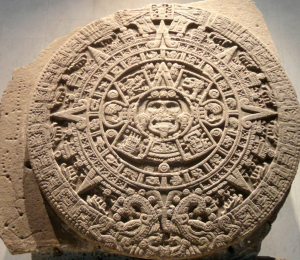Francisco López de Gómara
Lafitau, Joseph-François (N)
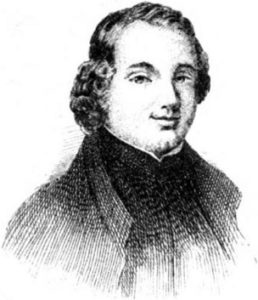 Joseph-François Lafitau (1681-1746) was a French Jesuit, who was engaged in missionary work among the Iroquois in North America during the early 18th century. Unlike Francisco López de Gómara who considered the native Americans as descendants of refugees from Atlantis, Lafitau attributed their origins to have been eastern Mediterranean. He specifically linked the language of the Iroquois with that of Lycia. Lafitau is sometimes referred to as an early diffusionist [1285/6].
Joseph-François Lafitau (1681-1746) was a French Jesuit, who was engaged in missionary work among the Iroquois in North America during the early 18th century. Unlike Francisco López de Gómara who considered the native Americans as descendants of refugees from Atlantis, Lafitau attributed their origins to have been eastern Mediterranean. He specifically linked the language of the Iroquois with that of Lycia. Lafitau is sometimes referred to as an early diffusionist [1285/6].
Columbus, Christopher
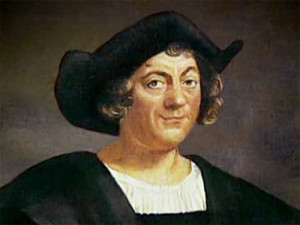 Christopher Columbus (1451-1506) is the name usually associated with the ‘discovery’ of America in the late 15th century. However, there appear to be a number of questions now being raised about the discoverer’s identity. Manuel Rosa seems to be leading the charge with his 2016 book, Columbus: The Untold Story[1889]. In a more recent article, Rosa succinctly claimed that “Historians mixed up the noble navigator Colón with the peasant weaver Colombo, giving the wool-weaver the glory that did not belong to him.” The article describes a convoluted but fascinating story of forgery, mistaken identity and misinformation that is well-documented and deserves a read(d).
Christopher Columbus (1451-1506) is the name usually associated with the ‘discovery’ of America in the late 15th century. However, there appear to be a number of questions now being raised about the discoverer’s identity. Manuel Rosa seems to be leading the charge with his 2016 book, Columbus: The Untold Story[1889]. In a more recent article, Rosa succinctly claimed that “Historians mixed up the noble navigator Colón with the peasant weaver Colombo, giving the wool-weaver the glory that did not belong to him.” The article describes a convoluted but fascinating story of forgery, mistaken identity and misinformation that is well-documented and deserves a read(d).
Columbus’ nationality is the subject of ongoing controversy although the majority accept him as Italian as there documentary evidence that he was born in Genoa. Pedants argue that as Italy did not exist as a state until the 19th century he cannot be called Italian. Up until then it was known as the Republic of Genoa (1099-1797). Apart from that, both Spain and Portugal have claimed that he belonged to their respective nations(f).
Ruggero Marino the author of Christopher Columbus: The Last Templar [1915], claims that he has evidence that Columbus’ first trip to the Americas was in 1485 for Pope Innocent VIII, not the better-known voyage for Ferdinand & Isabella of Spain in 1492(e)!
Columbus is not known to have made any specific statements regarding Atlantis, but some commentators have suggested that he was not only aware of Plato’s story but had consulted charts, such as Toscanelli’s(a), that depicted a mid-Atlantic island. López De Gomara was insistent that Columbus had read Plato’s Timaeus and Critias, while the historian, Bartolomé de las Casas (1484-1566), claimed that Plato’s story inspired Columbus to embark on his voyages of discovery!
A chart created by Paolo dal Pozzo Toscanelli (1397-1482) is also claimed to have been used by Columbus. However, the authenticity of the chart and associated correspondence was challenged by Henry Vignaud in a 1902 book(h), The Letter and Chart of Toscanelli [2091], which, understandably, generated considerable controversy(g) .
Toscanelli’s chart shows Antillia as a halfway marker from Portugal to Cipangu (Japan), which Columbus erroneously thought could be found on the other side of the Atlantic!
In the third chapter of The Message of Atlantis[494], Roger Coghill offers a vivid account of the background to Columbus’ protracted efforts to get support for his great voyage of discovery.
It is claimed that two of Columbus’ ships were built by Basques and that a quarter of their crews were Basque(b).
Nevertheless, S. P. Kershaw[1410.163] quoting from B. Keen[1500] notes that Columbus’ son Ferdinand ”explicitly stated that his father never showed any interest in Plato’s tale.”
The Flem-Aths in their Atlantis Beneath the Ice, which is a 2012 revised version of When the Sky Fell, begin the book with a reference to a memorandum sent by Charles Hapgood to President Eisenhower. In it, Hapgood sought the president’s assistance in locating a map used by Columbus, which he believed to still exist in Spanish archives. This map(c) was apparently one of a number used by Piri to produce his famed Piri Reis Map, which allegedly depicts an ice-free Antarctica. The Columbus map was not found.
(a) https://es.wikipedia.org/wiki/Archivo:Toscanelli_map.jpg
(b) https://www.quora.com/Is-it-true-that-Ancient-Greeks-knew-about-the-existence-of-America?share=1
(c) Saudi Aramco World : Piri Reis and the Columbus Map (archive.org)
(e) Atlantis Rising magazine #29 http://pdfarchive.info/index.php?pages/At
(f) https://www.thinkinitalian.com/was-christopher-columbus-italian/
(g) Catholic Encyclopedia (1913)/Paolo dal Pozzo Toscanelli – Wikisource, the free online library *
Gómara, Francisco López de
Francisco López de Gómara (1510-1566) was born in Seville and later retired there in 1557 where it is believed he also died. He was an ordained 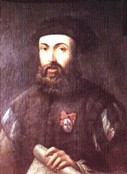 priest and in 1540 he became the private and domestic chaplain to Hernando Cortez. He wrote a number of historical works including a general history of the Indies [332]. Prince Philip, later Philip II of Spain, banned all his works in 1553. The relevant chapter in Hispania Victrix, in which he expressed his views on Atlantis is available in English online(a), as is the original Spanish text(b).
priest and in 1540 he became the private and domestic chaplain to Hernando Cortez. He wrote a number of historical works including a general history of the Indies [332]. Prince Philip, later Philip II of Spain, banned all his works in 1553. The relevant chapter in Hispania Victrix, in which he expressed his views on Atlantis is available in English online(a), as is the original Spanish text(b).
>Gomara’s acceptance of Plato’s Atlantis narrative and the 9,000 years mentioned by him, brought him into conflict with the church authorities because it contradicted the church’s teaching of the day which proclaimed that the Earth could not be older than 5,000 years!<
Gómara, following the Spanish invasion of America, was probably the first, in 1553, to suggest that the newly discovered continent was either Atlantis itself or the land beyond it. He cited Plato to support the proposition that the Native Americans were survivors of Atlantis. This was an idea that was adopted by many of his contemporaries.
Gómara was certain that Christopher Columbus had read Plato’s Timaeus and Critias suggesting that they gave added impetus to his westward voyage of discovery.
(a) https://www.jasoncolavito.com/goacutemara-on-atlantis.html
(b) https://books.google.ie/books/about/Hispania_Victrix.html?id=yBt3FLK1eUcC&redir_esc=y
Aztecs
The Aztecs of Mexico are believed by many writers to have originated as refugees from Atlantis. Their own traditions claim that they came from Aztlan, a land to the east. Francisco López de Gómara was the first European to suggest this link with Atlantis in 1551[332]. Ignatius Donnelly wrote at length on the subject and had his views frequently reflected in the work of writers at the beginning of the 20th century. Even today, some still associate Atlantis with the Aztecs(b), while others think that the Olmecs, predecessors of the Aztecs and Maya were Atlantean refugees(c).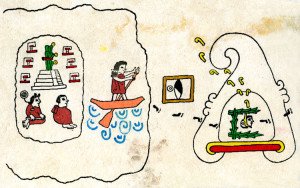
Tenochtitlan was the capital the Aztec Empire and at the time it was captured by the Spanish it was probably one of the largest cities in the world with an estimated population of 200,000.
It is remarkable that the descendants of Moctezuma, the last Aztec emperor are alive and well and living in Spain today as the noble house of Grau-Moctezuma de Toleriu(a).
The Aztec drawing on the left is interpreted as representing the migration of the Aztecs from an island in the Atlantic to the mainland of America. The assumption is that the island in question was Atlantis! The case for a clear Aztec-Atlantis connection is far from proven.
The first Latin writer of Aztec history was Ixitilxochill, himself of Aztec lineage, who maintained that the Olmecs had come to Eastern Mexico from the Antilles via Florida.
>In 1913, Thomas Crawford Johnston claimed that the Aztecs were Phoenician in origin – The civilisation of the Aztecs, using the name as a generic term, came from the eastern shores of the Mediterranean [1902.248].
A few years later, George H. Cooper, an American, proposed that the Aztec Calendar Stone (see right) “is a miniature, in another and advanced form of art, of Stonehenge [236.30]! Additionally, he claimed [p58]that the Pillars of Herakles mentioned by Plato is a reference to the monoliths of Stonehenge! Cooper goes further and nominates Salisbury Plain, where Stonehenge is located, as the site of the Garden of Eden [p105]!<
(a) The House of Moctezuma | andrewcusack.com
(b) Tenochtitlan: The Atlantis of the Ancient Aztec Empire – Pyramidomania
(c) Ancient Olmecs: Survivors of the city-continent of Atlantis (archive.org)

